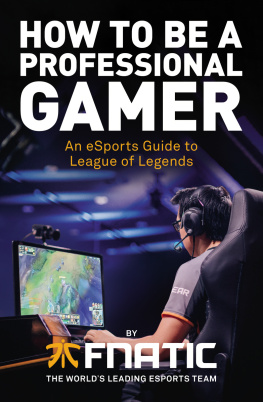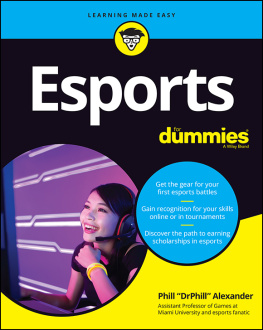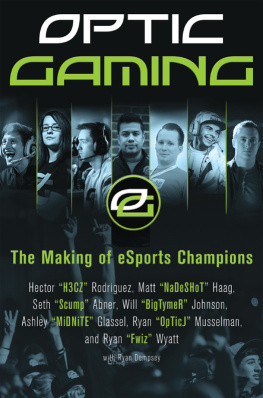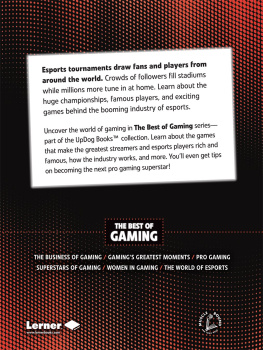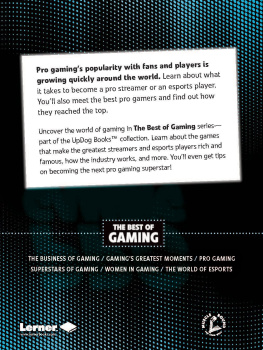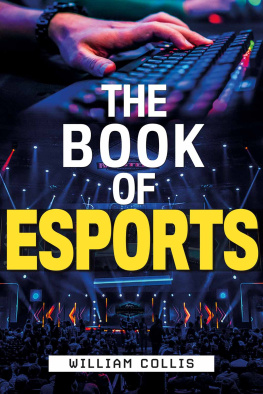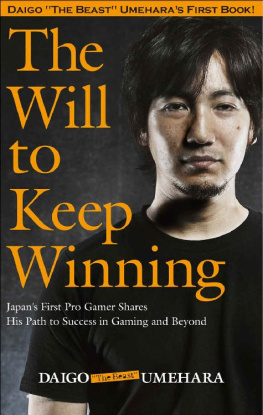Contents
About the Authors
Around the world Fnatic stands as a heavyweight in the world of eSports. With professional teams in the most popular games, they have dominated the sport. In 2011, they won the League of Legends World Championships. In both 2006 and 2009, Fnatic were awarded Team of the Year.
Mike Diver is Video Games Editor at VICE Magazine and has written gaming articles for the Guardian, Kotaku and Edge. When not playing games or reporting on them, he lectures at Southamptons Solent University. His first book, Indie Games: The Complete Introduction to Indie Gaming, was published in 2016. He lives by the British seaside with his wife, two sons and two cats.
About the Book
Its time to become a Legend.
Watched by millions and contested by the best professional gamers in the world, League of Legends is more than a game.
Fnatic have been competing in League of Legends since the very beginning of eSports. In How to be a Professional Gamer, they take you inside the elite world of the sport, and into the world of competitive gaming. Sharing their knowledge, expertise, and strategies, its only a matter of time before youre a world champion, too.
Including tips on game strategy, teamwork, mental strength and physical dexterity, How to be a Professional Gamer is both a guide for how to improve as a regular gamer, and the story of Fnatic and how theyve conquered the world of eSports.
Are you ready?
1
The Essential Ingredients of Being a Professional Gamer
IT MIGHT SEEM like a niche attraction compared to the big sports filling TV schedules and bringing big numbers to matches on a weekly basis, but dont be fooled: eSports is here, already in a big way, and its only going to get more popular. Speak to people in the industry and theyll tell you, without hint of sarcasm, that in years to come the player base and global audience for competitive video gaming will eclipse that of many traditional sports.
Sport has evolved over time, and eSports and gaming, more generally is doing the same. Today its perfectly natural for a kid to get home from school and spend hours in front of their PC, engaging in fantastical combat, or high-tension simulation play, against opponents potentially on the other side of the world. As the individual games grow in recognition, in subscribers, so their players begin to look for more information: how best to play the game; how to get ahead of their peers. And at the very top level of this tree of talent are the pro-gamers, those who earn their living travelling the world, playing video games against the best, inspiring millions.
In Europe, gaming can be seen as a very isolated, singular pursuit its hard to shake the awful stereotype of the kid alone in their room, the screen glowing, social life secondary to the interactive wonders before them. This is a hideously outdated perception of video gaming, however, and one only needs to look to South Korea to see how their culture of PC bangs cafes full of connected computers, allowing for large-scale cooperative play between friends and total strangers alike takes the at-home-alone nature of online gaming into the public space. And its South Korean teams that have established no little dominance in many eSports disciplines, including League of Legends. Since Fnatic claimed the inaugural League World Championship in 2011, every winning team at the Worlds has come from Asia, with three of the four winners from South Korea itself. Does this success link back to the wider acceptance of gaming as a valuable way to spend ones free time? Its hard to argue against the logic of PC bang culture feeding into the worlds healthiest competitive gaming scene.
Society will always grow alongside technology, and its the younger elements of it, those who have grown up with video games all around them, who are best positioned to keep up with it. This provides eSports with the opportunity to grow almost exponentially. It also means that competition for places in professional teams will become even fiercer than it is today, pushing the overall quality of play upwards. Yet there is no obvious career ladder in eSports: this is an underdeveloped industry in comparison to traditional sports like football or basketball, where careers can begin at a very young age, perhaps only five or six years old.
In eSports, no organisation is going to take on a player before they reach their teenage years. Then they typically go straight from home into a professional organisation, missing out on the years of steady coaching that a set-up at a football club would provide, helping the player to mature as well as evolve their skills. And thats a huge jump, to go from being a talented casual player into the spotlight of top-level competitive gaming.
But knowing what qualities are absolutely essential for a pro-gamer to possess will help anyone looking to do just that, and step up to playing on stages, before an online audience of millions. Being a fast learner is vital in competitive League of Legends, maybe more so than any other eSport, because of how its makers, Riot Games, continually patch it. This means that the game is always being updated, its avatars called champions having their abilities tweaked, sometimes for the better and sometimes not. These changes alter the meta, which is how the professionals are playing the game around each patch, and even the slightest alterations can have massive consequences for a teams success.

